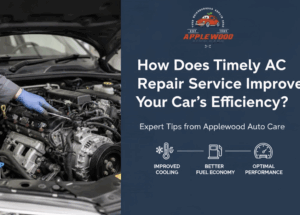Every vehicle owner wants a car that runs smoothly, starts easily, and performs efficiently. Over time, though, even the most reliable engines lose their edge due to wear, dirt buildup, and aging components. That’s where a car engine tune-up comes in — a preventive service designed to restore your engine’s power, fuel efficiency, and reliability.
A tune-up is more than just replacing spark plugs or checking fluids. It’s a comprehensive inspection and adjustment of your vehicle’s engine systems to ensure everything works harmoniously. Whether you drive a compact car, an SUV, or a high-performance vehicle, understanding what a tune-up involves — and why it’s essential — can save you money and headaches down the road.
Table of Contents
ToggleUnderstanding the Purpose of a Car Engine Tune-Up
A car engine tune-up is a maintenance process that revitalizes the performance of your engine by cleaning, replacing, or adjusting parts that naturally wear out over time. Engines rely on precise coordination between fuel, air, and spark to run efficiently. When one of these elements is off, performance drops, fuel economy suffers, and emissions rise.
A typical tune-up focuses on components that directly affect combustion and efficiency, including:
- Spark plugs and ignition coils
- Air and fuel filters
- Throttle body and intake valves
- Timing and idle speed
- Belts, hoses, and PCV valves
By addressing these parts, mechanics ensure your engine runs as close to factory specifications as possible.
How Tune-Ups Have Evolved Over Time
Decades ago, engine tune-ups were required every 10,000–15,000 miles because older engines had mechanical ignition systems and carburetors. Modern vehicles, equipped with electronic fuel injection and advanced sensors, don’t need tune-ups as frequently. However, that doesn’t mean they’re maintenance-free.
Today’s tune-ups involve computerized diagnostics and precision testing. Mechanics use specialized tools to read sensor data, check ignition timing, and identify performance inefficiencies. This approach ensures your vehicle receives exactly what it needs — no guesswork, just targeted maintenance.
Why a Car Engine Tune-Up Is Essential for Your Vehicle
1. Improved Engine Performance
Over time, spark plugs degrade, air filters clog, and sensors become dirty. These small issues can significantly reduce your engine’s ability to burn fuel efficiently. A tune-up replaces worn parts and cleans critical areas, allowing your engine to perform at its best. The result is smoother acceleration, better responsiveness, and more consistent power delivery.
2. Enhanced Fuel Efficiency
A poorly maintained engine has to work harder, burning more fuel than necessary. A tune-up corrects inefficiencies in the combustion system, restoring your vehicle’s optimal fuel economy. This means fewer trips to the gas station and more savings in your pocket.
3. Reduced Emissions
An unbalanced fuel-air mixture or failing ignition components can cause incomplete combustion, leading to higher emissions. Regular tune-ups ensure your engine runs cleanly and efficiently, contributing to a healthier environment and helping you pass emissions tests with ease.
4. Prolonged Engine Life
Think of a tune-up as preventive medicine for your car. Catching and fixing minor issues before they escalate prevents costly breakdowns later. Clean oil, fresh filters, and new spark plugs reduce strain on the engine’s internal components, helping it last longer.
5. Lower Risk of Unexpected Breakdowns
A neglected engine is more likely to fail at the worst possible time. Routine tune-ups identify worn belts, cracked hoses, and failing sensors before they cause roadside emergencies. It’s a simple investment that keeps you confident and safe on every drive.
When Should You Get a Car Engine Tune-Up?
Your vehicle’s manufacturer provides a recommended maintenance schedule, which usually includes when to perform a tune-up. For most modern cars, this ranges between 30,000 and 100,000 miles, depending on engine type and usage conditions.
However, there are warning signs that indicate your car may need a tune-up sooner:
- Difficulty starting or rough idling
- Reduced acceleration or sluggish performance
- Decreased fuel mileage
- Knocking or pinging noises from the engine
- The car warning lights turning on
If you notice any of these issues, it’s time to book an appointment with a trusted repair shop. Ignoring them could lead to more serious automotive warning signs and potentially expensive repairs.
What Happens During a Professional Engine Tune-Up
A professional tune-up goes far beyond basic maintenance. Mechanics perform a detailed inspection and adjustment of multiple systems. Here’s what’s typically included:
1. Spark Plug Replacement
Spark plugs ignite the fuel-air mixture inside the cylinders. Over time, they become fouled with carbon deposits, reducing efficiency. Replacing them ensures smooth combustion and consistent performance.
2. Filter Checks and Replacements
Air and fuel filters prevent debris from entering your engine. A clogged filter restricts airflow or fuel supply, causing sluggish performance. Replacing these filters keeps your engine breathing and burning fuel efficiently.
3. Ignition System Inspection
The ignition system includes spark plug wires, coils, and other components that deliver voltage to ignite the fuel mixture. Technicians check for corrosion or weak connections to ensure reliable starts.
4. Throttle Body Cleaning
Carbon buildup around the throttle body can cause idle fluctuations or poor throttle response. Cleaning it improves airflow and ensures smoother acceleration.
5. Diagnostic Scanning
Modern vehicles have onboard computers that store error codes. Mechanics use diagnostic scanners to read these codes, helping them identify underlying issues quickly and accurately.
6. Fluid Level and Condition Check
From engine oil to coolant, all essential fluids are checked and topped off as needed. Contaminated or low fluids can reduce engine efficiency and cause damage over time.
How Tune-Ups Help Avoid Major Repairs
Skipping regular tune-ups can lead to bigger, more expensive problems later. For example, neglected spark plugs can cause misfires that damage the catalytic converter. Similarly, dirty filters can force the engine to overwork, leading to overheating or premature wear.
Routine tune-ups also help prevent problems that might otherwise require extensive car repair or even transmission repair down the line. By maintaining your vehicle’s engine in peak condition, you reduce the overall stress on other vital components, ensuring a more balanced and reliable ride.
The Connection Between Tune-Ups and Other Vehicle Services
While engine tune-ups primarily focus on performance, they’re part of a broader preventive maintenance strategy. Regular services such as oil changes, tire rotations, and brake pad service work hand in hand with tune-ups to keep your vehicle safe and efficient.
A comprehensive maintenance approach ensures every system — from brakes to transmission — operates harmoniously. This not only enhances performance but also boosts your vehicle’s overall resale value.
Benefits of Getting Tune-Ups from a Trusted Auto Shop
Choosing a reputable service center for your tune-up is essential. Certified technicians have the training and diagnostic tools to identify issues quickly and service your vehicle according to manufacturer standards. They’ll also use quality replacement parts, ensuring long-lasting results.
Professional shops often include multi-point inspections and warranties, giving you confidence that your car will continue performing optimally long after the service is complete.
Practical Tips for Maintaining Engine Health Between Tune-Ups
- Follow Scheduled Oil Changes: Clean oil reduces friction and removes debris from your engine.
- Use Quality Fuel: Premium fuels with detergents can help prevent buildup in the fuel system.
- Pay Attention to Unusual Sounds or Vibrations: They may indicate a developing issue.
- Keep the Cooling System Healthy: Regular coolant checks prevent overheating.
- Drive Smoothly: Avoid aggressive driving, which can strain engine components unnecessarily.
Conclusion: A Tune-Up Is an Investment in Your Car’s Future
A car engine tune-up isn’t just another maintenance service — it’s an investment in your vehicle’s performance, reliability, and longevity. Regular tune-ups ensure your engine runs efficiently, saves fuel, and minimizes costly repairs in the long run.
If your car feels sluggish, your gas mileage drops, or you notice unusual noises, it’s time to schedule a tune-up with a trusted auto repair professional. Keeping up with this essential service guarantees smoother rides and peace of mind wherever the road takes you.
FAQs About Car Engine Tune-Ups
- How often should I schedule a car engine tune-up?
Most modern vehicles need a tune-up every 30,000 to 100,000 miles, depending on manufacturer recommendations and driving habits. - What’s included in a standard tune-up service?
Typical tune-ups include replacing spark plugs, filters, and fluids; inspecting ignition and fuel systems; and performing diagnostics. - Can I do an engine tune-up myself?
Basic maintenance like replacing filters or spark plugs is possible at home, but a professional tune-up ensures thorough diagnostics and safety checks. - How can I tell if my car needs a tune-up?
Look for signs like poor fuel economy, difficulty starting, rough idling, or illuminated warning lights. - Will a tune-up improve my car’s fuel efficiency?
Yes. A properly tuned engine burns fuel more efficiently, improving gas mileage and overall performance.









